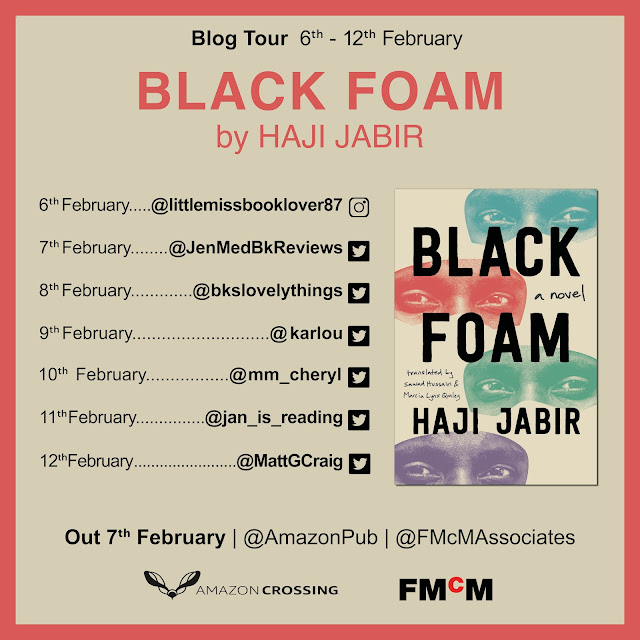A chameleon, Dawoud―or David, Adal, or Dawit, depending on where and when you meet him―is not lost in this whirl of identities. In fact, he is defined by it.
Black Foam follows a group of Ethiopian Jews, the “Falash Mura”, who driven by poverty and desperation, emigrate to Israel in search of a better life. Amongst the group is“Dawoud”.
Dawoud is on the run from his murky past, aiming to discover where he belongs. He tries to assimilate into different groups along his journey through North Africa and Israel, changing his clothes, his religious affiliations, and even his name to fit in, but the safety and peace he seeks remain elusive. It seems prejudice is everywhere, holding him back, when all he really wants is to create a simple life he can call his own.
Dawoud’s journey is circuitous and specific, but the desire to belong is universal.
Spellbinding to the final page, Black Foam is both intimate and grand in scale, much like the experiences of the millions of people migrating to find peace and safety in the twenty-first century.
I'm delighted to be hosting the blog tour for Black Foam today. Many thanks to Haji Jabar, Amazon Crossing books, and Rhiannon and Katya from FMcM Associates for inviting me and for sending me a hardback copy of the novel.
The global refugee crisis and the large-scale displacement and migration of people is a subject I'm always keen to gain a deeper understanding of. Haji Jabar is an Eritrean author who works as a journalist for Al Jazeera and Black Foam was longlisted for the 2019 International Prize for Arabic Fiction, and I was particularly intrigued to read a novel written from a different perspective. I'm the first to hold up my hands and admit I know very little about Eritrea or its people and I looked forward to learning more.
It would be fair to say that Black Foam isn't quite what I expected and while I learn about some issues in Eritrea, especially regarding the war between Eritrea and Ethiopia, this isn't a comprehensive exploration of the country and its recent past. What it is, however, is an intimate portrait of a flawed man who finds himself among the 'black foam' – the people who have to make their lives on the surface of their adopted countries, without ever being accepted enough to fully assimilate. For convenience's sake, I will refer to the central character by the name 'Dawoud' for this review but that's not the only name he uses during the course of the novel, as he adapts, schemes and tries to survive, constantly searching for a place to finally belong.
The narrative is quite tricky to follow at first as it switches between the present and recent past, sometimes within the same chapter. Nevertheless, there is a flow to the story and I was always engaged by the struggles of its complex protagonist. There is often a reluctance in the Western world to accept that young men require sanctuary as much as women and children – arguably even more so in countries where forced conscription and torture of draft evaders is commonplace. It's perhaps even harder to acknowledge that some of these young men will resort to extreme, even violent measures, in their search for refuge. Therefore, I thought it was brave of Haji Jabar to reflect the realities of these migratory lives and impressive to ensure that for all his failings and the doubts as to the veracity of his accounts at times, it's impossible not to empathise with Dawoud.
This isn't a gratuitously violent or explicit novel but there are some scenes which are entirely consistent with the situation but leave little to the imagination. As Dawoud searches for somewhere to belong, in Ethiopia and then Israel, the sense of place is superb throughout. Meanwhile, the characterisation isn't always particularly penetrating but that befits the life of a person who lives on the surface and can only make transitory connections with others. The translation by Sawad Hussain and Marcia Lynx Qualey is excellent, allowing the meandering storyline to flow throughout.
Black Foam is a sombre, thoughtful and insightful novel with a moving final chapter written in memory of a young Eritrean called Habtom Ouldi Mikael Zaroum. Although a relatively short book, it's not an easy read but it is one that I recommend to anybody who wishes to understand more of the reasons why people might decide to flee the country of their birth.
Black Foam is published in the UK by Amazon Crossing and can be purchased here.
Follow the blog tour, details are below.
About the Author
Haji Jabir is an Eritrean novelist who was born in the city of Massawa on the Red Sea Coast in 1976. He currently lives in Doha, Qatar, where he works as an Al Jazeera journalist. Jabir’s creative aim is to shed light on Eritrea’s past and present and to extricate his homeland from its cultural isolation. He is one of the most important Arabic-language authors of his time.




Comments
Post a Comment